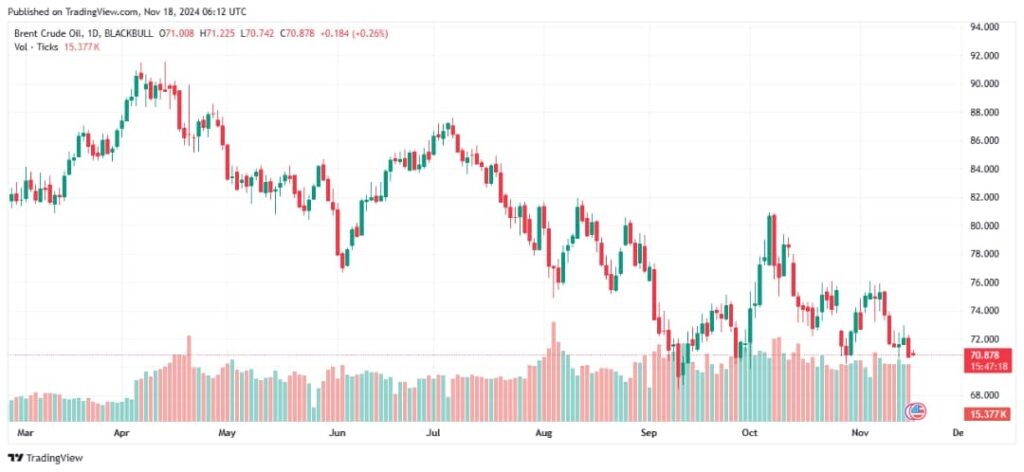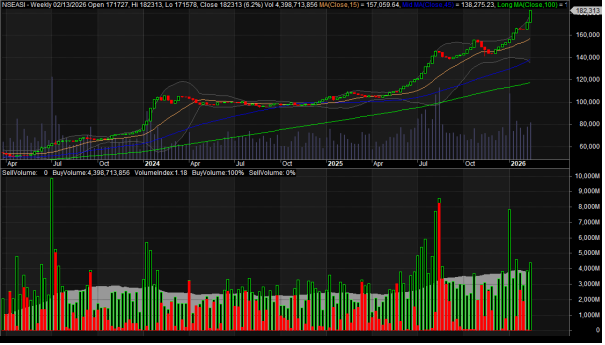
Akintunde Oyedokun
Research Analyst
Brent crude fell to $71.04 and WTI to $67.02 on Friday, both down over 2%. Weekly losses were 4% and 5%, respectively, as weaker Chinese demand and trade tensions raised economic concerns.
The IEA highlighted slowing global oil demand, citing China’s struggles and the rise of electric vehicles.
Japan’s Economy Exceeds Q3 Projection By 0.9% Annualized Growth
Japan’s economy expanded at an annualized rate of 0.9% during the July-September quarter, according to government data released on Friday. This growth surpassed the median market forecast of 0.7%, reflecting stronger-than-expected economic performance. On a quarterly basis, gross domestic product (GDP) increased by 0.2%, in line with market projections. The figures highlight a steady recovery in the world’s third-largest economy despite global economic uncertainties.
UK Economy Shrinks in September, Q3 Growth Slows as Minister Pledges Reforms
The UK economy contracted by 0.1% in September, with sluggish performance across services, manufacturing, and construction, the Office for National Statistics reported. Quarterly growth slowed to 0.1%, below forecasts and down from 0.5% in Q2. Finance Minister Rachel Reeves vowed to drive growth through investment and regulatory reforms, particularly in the financial sector. While business investment rose for the fourth consecutive quarter, overall economic recovery remains weak, with GDP up just 3% since 2019.
U.S. Import Prices Edge Up In October, Signals Persistent Inflation Pressure
U.S. import prices rose 0.3% in October, reversing the previous month’s decline, as higher fuel and goods costs continued to drive inflation. Economists had expected a 0.1% drop. Over the year, import prices increased 0.8%, recovering from a small dip in September. Fuel prices rose 1.5%, while food prices fell 1.6%. Excluding food and fuel, import prices climbed 0.4%, with core import prices up 2.2% year-on-year. The data highlights ongoing inflation challenges, which may influence future Federal Reserve rate decisions.
Agriculture Drives Tunisia’s 1.8% Economic Growth In Q3 2024
Tunisia’s economy grew by 1.8% year-on-year in the third quarter of 2024, with the agricultural sector playing a key role in the expansion, according to the national statistics institute. For the first nine months of the year, overall growth reached 1%. The country is aiming for a 3.2% growth rate in 2025, compared to the 2.1% expected for 2024.
Nigeria’s Debt-to-GDP Ratio Jumps to 55% In June 2024, Up from 42.4% In Dec 2023
Nigeria’s debt-to-GDP ratio has climbed to 55% by June 2024, marking a sharp increase from 42.4% in December 2023. The Debt Management Office reports that external debt now totals $42.9 billion, while domestic debt has reached N71.2 trillion. This rise is driven by a combination of factors, including the depreciation of the naira and increased domestic borrowing at higher interest rates. In March 2024, the debt-to-GDP ratio crossed the 50% threshold for the first time, following the release of updated GDP data. This measure is crucial for evaluating fiscal health, financing access, and public investment in sub-Saharan Africa.








